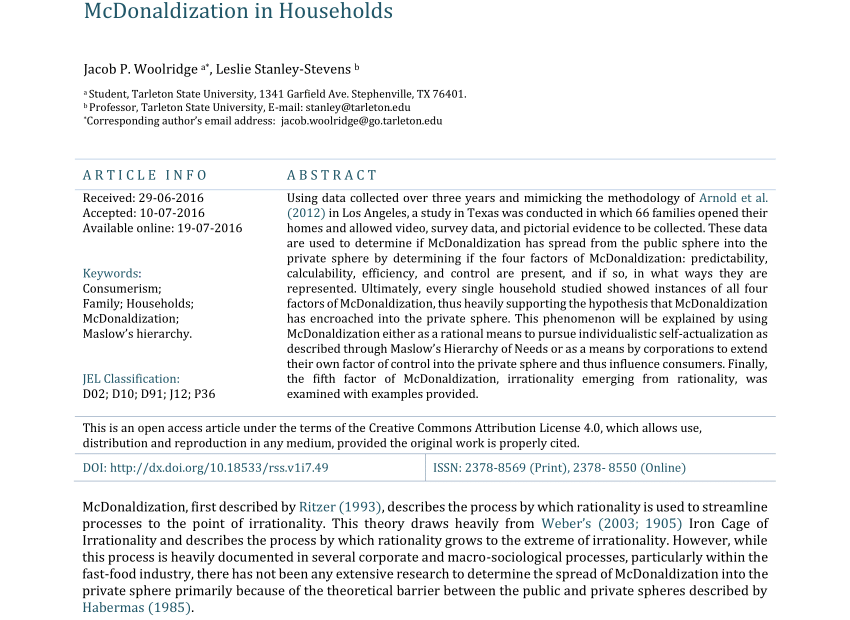Imagine walking into a fast-food restaurant, ordering a pre-determined meal, and being served within minutes, all at a predictable price. This seemingly mundane experience is actually a window into a powerful and pervasive force shaping our world: McDonaldization. This concept, coined by sociologist George Ritzer, refers to the increasing dominance of rationalization, efficiency, calculability, predictability, and control in all aspects of our lives, inspired by the principles of the fast-food industry. But how does this relentless quest for efficiency impact our society, our values, and even our humanity?

Image: www.ipcstore.com
McDonaldization, at its core, is about stripping complexity and individuality, replacing them with rigid processes and standardized products. From the assembly line to the online shopping experience, McDonaldized systems aim to achieve maximum output with minimal effort, prioritizing speed and predictability over creativity and personalization. This article will delve into the multifaceted nature of McDonaldization, exploring its origins, its implications, and its potential for both progress and peril.
From Burger Joints to Global Phenomenon
The origins of McDonaldization can be traced back to the early 20th century with the rise of industrialization and mass production. The concept gained prominence in the 1970s, coincidentally with the meteoric rise of McDonald’s as a global fast-food empire. The efficiency of its assembly line, its standardized menus, and its focus on speed perfectly embodied the principles of McDonaldization.
This principle wasn’t confined to just food. It quickly spread to other industries—retail, healthcare, education—a testament to its allure of speed, efficiency, and control. Think about the automated checkout at your local grocery store, the online courses replacing traditional classrooms, and the pre-packaged healthcare plans offered by insurance companies. These are all examples of how McDonaldization is transforming our lives.
The Four Pillars of McDonaldization
McDonaldization operates on four key principles, each contributing to its widespread impact:
- Efficiency: This principle emphasizes minimizing time and effort to achieve maximum output. Think about the drive-thru windows at McDonald’s, allowing customers to grab their orders without stepping out of their cars.
- Calculability: McDonaldized systems prioritize quantity over quality, focusing on measurable metrics like volume, speed, and output. Supersized meals and value combos that emphasize quantity over nutritional value are prime examples.
- Predictability: McDonaldized systems strive for consistency and uniformity across all locations and time. This is evident in the standardized menus and experiences offered by fast-food chains, ensuring the same taste regardless of where you are in the world.
- Control: McDonaldized systems aim to minimize human error and maximize control through automation and technology. This means replacing human interaction with self-service kiosks, pre-programmed machines, and automated processes.
The Double-Edged Sword of Efficiency
McDonaldization undeniably has its benefits. It offers greater efficiency, lower prices, and increased access to goods and services. Imagine the impact of efficient mass production: a larger population can access affordable food, clothing, and healthcare thanks to efficient manufacturing processes. It’s hard to argue with the convenience and accessibility offered by online shopping and automated services.
But this efficiency comes at a cost. The pursuit of speed and standardization can stifle creativity, innovation, and human connection. The relentless focus on calculability can lead to a devaluation of quality and an obsession with quantity. Predictability, while providing comfort, can also result in uniformity and a lack of individual expression.

Image: chinhphucnang.com
The Human Cost
The impact of McDonaldization extends beyond mere efficiency. It can also lead to:
- Dehumanization: McDonaldized systems often replace human interaction with automated processes and impersonal procedures. The customer service representative becomes a script reader, the teacher a facilitator of standardized tests, and the doctor a diagnostician focusing on symptoms rather than the whole person.
- Work alienation: Employees in McDonaldized environments often find themselves performing repetitive tasks in a highly controlled environment, leading to a lack of autonomy and job satisfaction.
- Cultural homogenization: The global dominance of McDonaldized principles can lead to the erosion of cultural diversity, replacing local traditions with standardized experiences. This homogenization can create a sense of sameness and undermine the richness of individual cultures.
Resistance and Reimagining
The relentless march of McDonaldization isn’t unstoppable. There’s a growing movement toward humanizing the workplace and creating more sustainable, ethical, and socially responsible systems.
- The Slow Food Movement: This movement emphasizes the importance of local food systems, sustainable farming practices, and enjoying food at a slower pace. It celebrates the connection between food, culture, and community, reminding us of the importance of quality and experience over quantity and speed.
- The Makers Movement: This movement values craftsmanship, creativity, and the desire to create something unique and meaningful. It encourages individuals to develop skills, explore their passions, and engage in meaningful work that transcends the limitations of assembly lines and pre-programmed tasks.
- The Ethical Consumption Movement: Consumers are increasingly becoming aware of the social and environmental implications of their choices. This movement advocates for purchasing products that are ethically sourced, produced sustainably, and support fair labor practices.
How Does Mcdonaldization Affect Society
The Future of McDonaldization
McDonaldization is a powerful force, but it’s not inevitable. By recognizing its potential downsides and embracing alternatives, we can shape a future where efficiency doesn’t come at the expense of human values and creativity. We can build systems that are both efficient and humane, where technology serves our needs without dictating our lives.
We must actively resist the homogenization and dehumanization that can accompany McDonaldization. We can do this by supporting local businesses, seeking out experiences that value individuality, and prioritizing quality over quantity. The future belongs to those who recognize the limitations of efficiency and embrace a more balanced and fulfilling approach to living. Let’s step away from the golden arches and embrace a future that celebrates the richness and diversity of the human experience.



/GettyImages-173599369-58ad68f83df78c345b829dfc.jpg?w=740&resize=740,414&ssl=1)


